- Home
- »
- Consumer F&B
- »
-
Bottled Water Market Size And Share, Industry Report, 2030GVR Report cover
![Bottled Water Market Size, Share & Trends Report]()
Bottled Water Market (2025 - 2030) Size, Share & Trends Analysis Report By Product (Still Water, Sparkling Water, Functional Water), By Distribution Channel (On-trade, Off-trade), By Packaging, By Packaging Size, By Price Range, By Region, And Segment Forecasts
- Report ID: GVR-2-68038-411-6
- Number of Report Pages: 100
- Format: PDF
- Historical Range: 2018 - 2024
- Forecast Period: 2025 - 2030
- Industry: Consumer Goods
- Report Summary
- Table of Contents
- Interactive Charts
- Methodology
- Download FREE Sample
-
Download Sample Report
Bottled Water Market Summary
The global bottled water market size was estimated at USD 348.64 billion in 2024 and is projected to reach USD 509.18 billion by 2030, growing at a CAGR of 6.4% from 2025 to 2030. This can be attributed to increasing health and wellness trends among consumers, the rising need for convenience and accessibility, and robust production innovation.
Key Market Trends & Insights
- North America bottled water market is expected to grow at a CAGR of 5.8% from 2025 to 2030.
- The bottled water market in U.S. is expected to grow at a CAGR of 5.7% from 2025 to 2030.
- Based on product, still bottled water segment accounted for a revenue share of 75.5% in 2024.
- Based on packaging, pet bottled water segment accounted for a revenue share of 80.1% in 2024.
- Based on packaging size, medium sized bottled water segment accounted for a revenue share of 72.7% in 2024.
Market Size & Forecast
- 2024 Market Size: USD 348.64 Billion
- 2030 Projected Market Size: USD 509.18 Billion
- CAGR (2025-2030): 6.4%
- Asia Pacific: Largest market in 2024
The growing demand and consumption of bottled water can largely be attributed to increasing health consciousness among consumers. With rising awareness about the harmful effects of sugary beverages, such as sodas and juices, people are shifting towards healthier hydration options. Bottled water is viewed as a simple and effective way to stay hydrated without the added sugars, calories, or artificial ingredients associated with other drinks. As more individuals prioritize wellness and hydration in their daily lives, premium drinking water bottles has become a go-to choice, especially for those with active and health-conscious lifestyles.
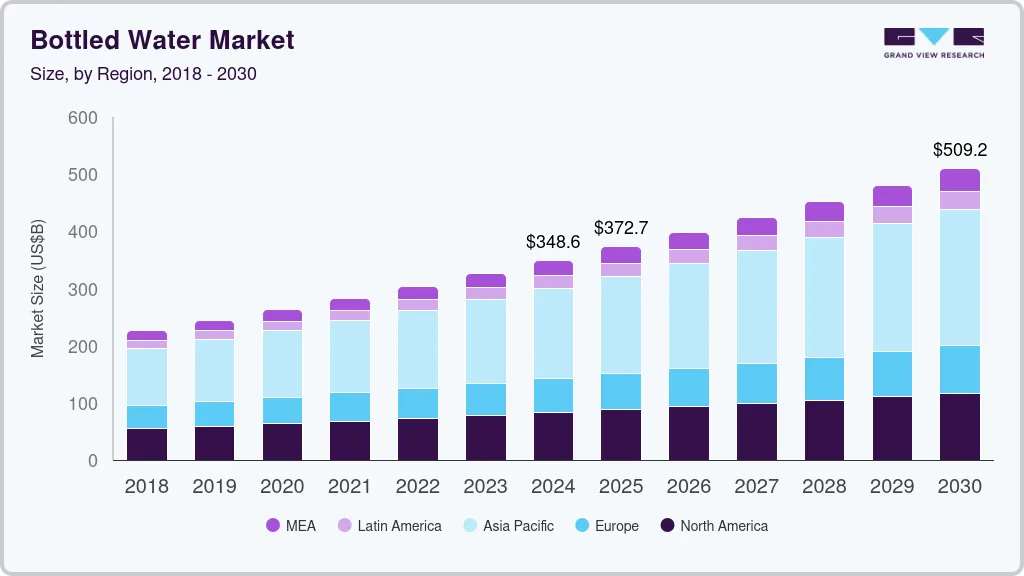
One of the key factors driving the bottled water market is the increasing health consciousness among consumers. As people become more aware of the importance of hydration and its role in overall health, they opt for bottled water over sugary beverages such as sodas and juices. This shift is particularly evident among millennials and health-conscious individuals prioritizing natural and low-calorie options. The perception that bottled water is a healthier alternative has led to a surge in demand as consumers seek products that align with their wellness goals. According to a survey by the International Bottled Water Association, in 2023, bottled water consumption in the U.S. reached 15.94 billion gallons, solidifying its position as the most consumed packaged beverage for the eighth year in a row. In contrast, carbonated soft drink sales totaled 11.84 billion gallons during the same period. This trend highlights a rising consumer preference for healthier hydration choices, with per capita bottled water consumption at 46.4 gallons, compared to 34.4 gallons for soft drinks.
The fast-paced lifestyle of modern consumers has also contributed significantly to the growth of the bottled water market. With busy schedules, many individuals prefer convenient hydration solutions that can be easily carried and consumed on the go. Bottled water offers a practical option for staying hydrated during commutes, workouts, or outdoor activities. The availability of various packaging sizes- from single-serve bottles to larger family packs- further enhances convenience, making it easier for consumers to choose bottled water as their preferred beverage.
A notable factor propelling the growth of the bottled water market is robust production innovation. This involves the introduction of enhanced manufacturing processes and the development of new product variants to meet diverse consumer demands and preferences. Innovations in packaging, such as eco-friendly materials and convenient designs, along with advancements in water purification and flavor infusion technologies, have significantly contributed to making bottled water more attractive to consumers. These innovative efforts not only aim to improve product quality and sustainability but also seek to differentiate offerings in a highly competitive market, thus driving consumer interest and market growth. For instance, in March 2023, an India-based startup developed an innovative technology that allows for the extraction of drinking water from the atmosphere. This breakthrough is particularly significant in regions facing water scarcity, as it provides a sustainable and renewable source of clean water. The technology employs a combination of cooling and dehumidification processes. Air is drawn into the system and cooled below its dew point, causing moisture to condense. The collected water is then filtered and mineralized to ensure it meets safety standards for drinking.
Consumer Insights for Bottled Water
A major factor driving bottled water consumption is the increasing health consciousness among European consumers. Many individuals are moving away from sugary carbonated drinks and opting for bottled water as a healthier alternative. According to Natural Mineral Waters Europe, around 53% of European consumers choose bottled water for its perceived purity and health benefits. Additionally, the rising popularity of functional and fortified waters enriched with minerals, electrolytes, and vitamins reflects this growing health-driven trend.
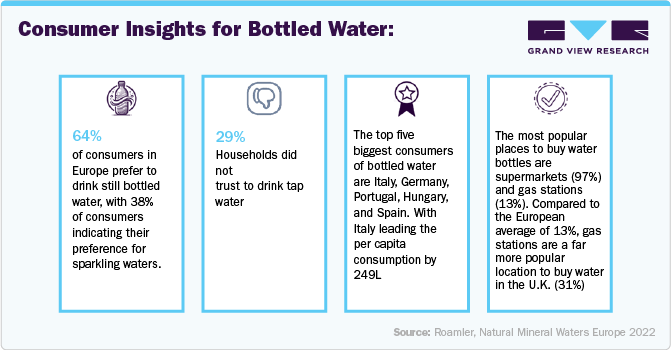
Bottled water consumption patterns vary across Europe. Italy has the highest per capita consumption, exceeding 200 liters per person per year. Germany follows closely, driven by a strong preference for carbonated mineral water. France and Spain also have a long-standing tradition of consuming natural mineral water, leading to a high demand for premium bottled water brands. In contrast, Northern European countries, including Scandinavia and the UK, have lower bottled water consumption due to the widespread availability of high-quality tap water. However, demand for flavored and vitamin-enhanced waters is growing in these regions.
Environmental concerns are playing an increasingly significant role in shaping bottled water preferences. Consumers are favoring eco-friendly packaging solutions, such as recycled PET (rPET) bottles, glass bottles, and alternatives like Tetra Pak and aluminum cans. Many brands are also investing in carbon-neutral and plastic-free packaging initiatives to align with sustainability goals, responding to growing consumer expectations for responsible packaging.
The demand for premium and flavored bottled water is rising, particularly among younger consumers. Premium bottled water sourced from alpine regions, volcanic springs, and deep-sea mineral sources is gaining popularity. Similarly, flavored and infused waters containing fruit extracts, herbs, and botanicals are becoming a preferred choice. In some markets, alkaline and electrolyte-enhanced water are also attracting interest due to their perceived health benefits. In January 2025, Sparkling Ice launched an exciting new product line called the STARBURST RED PACK, featuring two new zero-sugar flavors inspired by the popular STARBURST candy. The pack combines new STARBURST Fruit Punch and STARBURST Watermelon flavors with existing favorites Kiwi Strawberry and Black Cherry.
Concerns over tap water quality continue to drive bottled water consumption in certain parts of Europe. In Southern and Eastern European countries such as Greece, Romania, and Bulgaria, some consumers distrust tap water due to concerns about contamination, taste, or outdated infrastructure. This has led to a sustained preference for bottled mineral water in these regions.
Pricing Analysis
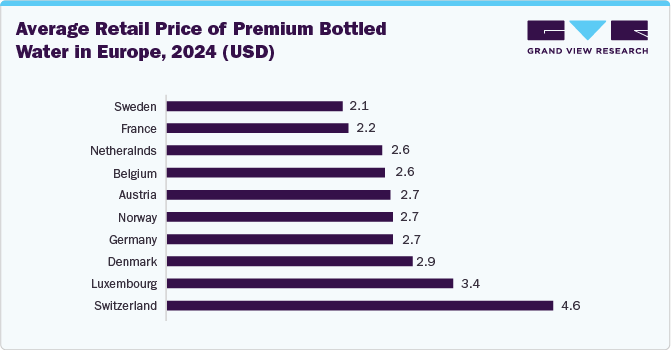
The pricing of bottled water across Europe exhibits significant variation. Factors influencing these price differences include the availability of natural water sources, production and transportation costs, local taxes, and consumer preferences. In some regions, reliance on bottled water is higher due to concerns about tap water quality, which can increase demand and prices.
Market Concentration & Characteristics
The bottled water market is witnessing a high degree of innovation, driven by consumer demand for health, convenience, and sustainability. Brands are introducing functional and enhanced waters infused with electrolytes, vitamins, and probiotics to cater to health-conscious consumers. Sustainable packaging solutions, including recycled PET, biodegradable water bottles, aluminum cans, and glass, are gaining traction to reduce plastic waste. The market is also expanding with flavored and alkaline water options, offering natural fruit-infused and pH-balanced alternatives.
The bottled water market is witnessing a high level of mergers and acquisitions (M&A) as companies seek to expand their market share, diversify product portfolios, and strengthen their global presence. Major beverage corporations are acquiring premium, functional, and sustainable bottled water brands to capitalize on shifting consumer preferences. Strategic partnerships and acquisitions also enable companies to access new distribution networks and advanced packaging technologies.
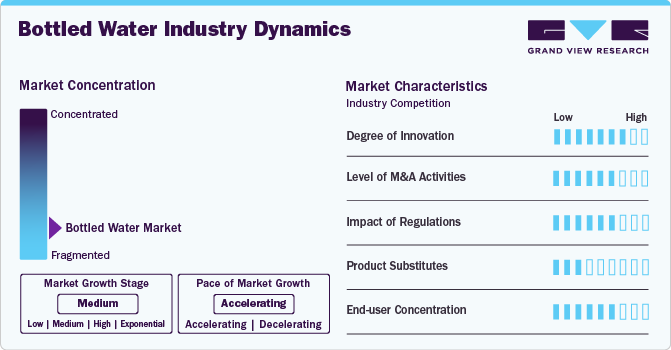
The bottled water market faces moderate to high availability of product substitutes, including tap water, filtered water, flavored drinks, and functional beverages like sports drinks and infused waters. Many consumers opt for home water filtration systems as a cost-effective and eco-friendly alternative to bottled water. Additionally, the growing demand for plant-based and electrolyte-enhanced drinks provides further competition. However, the convenience, portability, and perceived purity of bottled water continue to drive its strong consumer preference, despite the rising popularity of substitutes.
The bottled water market has a highly diverse end-user concentration, catering to individual consumers, households, businesses, and institutions such as hotels, restaurants, and fitness centers. While retail consumers remain the dominant segment, the growing demand from corporate offices, travel, and hospitality industries further drives sales. Additionally, health-conscious individuals, athletes, and environmentally aware consumers are increasingly shaping market trends, influencing brands to offer premium, functional, and sustainable bottled water options to meet evolving preferences.
Regulations play a crucial role in the bottled water industry, impacting production, labeling, quality standards, and environmental sustainability. Government agencies and health authorities enforce strict safety and purity standards, requiring companies to comply with water source protection, treatment processes, and packaging regulations. Additionally, growing concerns over plastic waste and carbon emissions have led to policies promoting recyclable materials, deposit return schemes, and sustainability initiatives. Compliance with these regulations increases operational costs but also drives innovation in eco-friendly packaging and responsible sourcing.
Product Insights
Still water accounted for a revenue share of 75.5% in 2024. Still bottled water offers a convenient and portable hydration solution, particularly for people with active lifestyles, ensuring access to clean water anytime and anywhere. The rising emphasis on personal health and wellness has fueled a growing preference for still water, which is often seen as a pure and health-conscious alternative to other beverage options. Health-focused consumers perceive still bottled water as free from impurities such as chemicals, heavy metals, and bacteria, aligning with their pursuit of cleaner, healthier hydration choices.
Sparkling bottled water market is expected to grow at a CAGR of 7.9% from 2025 to 2030. As consumers become more willing to spend on premium and artisanal products, sparkling bottled water companies that offer unique flavors and high-quality sourcing appeal to this growing market. Many people are shifting away from sugary sodas and other high-calorie beverages, seeking healthier alternatives. For instance, in April 2024, PepsiCo launched Bubble Burst, a new lightly sweetened sparkling water beverage. The product comes in six fruit flavors, including Triple Berry, Peach Mango, Watermelon Lime, Pineapple Tangerine, Cherry Lemonade, and Tropical Punch. Each flavor contains 10 calories or less with no added sugar and comes in 100% recycled PET bottles. Sparkling water offers a refreshing, calorie-free option without added sugars or artificial ingredients. With the increasing emphasis on eco-friendly packaging, brands that offer sustainable bottles or reusable options are attracting environmentally-conscious consumers. This aligns with the wider trend of reducing plastic waste.
Packaging Insights
PET bottled water accounted for a revenue share of 80.1% in 2024, owing to its significant advantages in convenience, recyclability, and lightweight nature compared to other packaging materials. The widespread preference for packaged natural mineral water bottles among consumers stems from their ease of transport and use, alongside a growing awareness and concern for environmental sustainability. PET bottles, being fully recyclable, align with increasing global initiatives towards reducing plastic waste and promoting circular economies. Furthermore, the lightweight characteristics of PET bottles reduce transportation costs and carbon footprint, making them a favored choice among manufacturers and consumers alike, thus driving their market. In October 2023, Coca-Cola India launched its first 100% recycled polyethylene terephthalate (PET) bottle, specifically for its Kinley packaged drinking water brand. This initiative marks a significant step towards promoting sustainability and plastic circularity in the country. The company introduced these bottles as part of its broader commitment to environmental responsibility and aims to reduce its carbon footprint.
Canned bottled water segment is expected to grow at a CAGR of 7.0% from 2025 to 2030. This can be primarily attributed to increasing consumer awareness towards environmental sustainability. It can offer a eco-friendlier alternative to plastic bottles due to their higher recyclability rate and efficiency in transportation, which contributes to lower carbon emissions. Additionally, the convenience and durability of cans appeal to active and on-the-go lifestyles, making them a popular choice among consumers. As a result, both beverage companies and consumers are shifting towards canned water, driving significant growth in this market segment. For instance, in April 2024, Coca-Cola’s Smartwater brand unveiled 12-ounce aluminum cans with a new design, marking the first instance of vapor-distilled water being offered in this packaging format. The cans feature both Smartwater Original and SmartWater Alkaline with Antioxidant, catering to consumer preferences for convenient and environmentally friendly options.
Packaging Size Insights
Medium sized bottled water accounted for a revenue share of 72.7% in 2024. The increasing demand for medium-sized bottled water (1.1 to 5 liters) can be attributed to a shift in consumer behavior toward convenience, value for money, and sustainability. These sizes are ideal for households, office spaces, and fitness enthusiasts who prefer larger quantities that can last longer, reducing the need for frequent purchases. Additionally, there’s a growing awareness of the environmental impact of single-use plastics, leading to a preference for larger bottles that generate less plastic waste. Moreover, medium-sized bottles often offer a more cost-effective option compared to smaller ones, catering to both convenience and budget-conscious consumers.
Small sized bottled water market is expected to grow at a CAGR of 7.2% from 2025 to 2030. The increasing popularity of small-sized bottled water (0.5 to 1 liter) is driven by the growing demand for on-the-go convenience and portability. These sizes are perfect for individual consumption during daily activities like commuting, exercising, or running errands. As consumers prioritize convenience and hydration throughout the day, smaller bottles offer a practical and easily accessible solution. Additionally, they cater to impulse purchases and are often more affordable, making them appealing to a wide range of consumers. The rise in health-consciousness also plays a role, as people seek easy ways to stay hydrated without carrying larger, bulkier bottles.
Price Range Insights
Mass priced bottled water accounted for a revenue share of 89.6% in 2024. The rise in mass-priced bottled water is driven by increasing consumer demand for affordable hydration options. As bottled water becomes a daily staple, many consumers seek budget-friendly choices, especially in regions where clean drinking water may not always be easily accessible. Mass-priced bottled water offers an economical solution, making it an attractive option for cost-conscious buyers. Additionally, retailers and manufacturers are responding to the growing trend of health-consciousness by offering more affordable, accessible hydration alternatives. This trend is further amplified by convenience, as mass-priced water is widely available in various locations, from supermarkets to convenience stores.
Premium bottled water market is expected to grow at a CAGR of 7.5% from 2025 to 2030. The rise in premium-priced bottled water is fueled by growing consumer interest in health, wellness, and sustainability. Many consumers are increasingly seeking high-quality, mineral-rich, or specialty waters that offer perceived health benefits, such as enhanced hydration or added nutrients. Premium bottled water often comes from unique or pristine sources, and their branding emphasizes purity, luxury, and exclusivity, appealing to affluent customers. Additionally, eco-conscious buyers are drawn to premium water brands that prioritize sustainable packaging and ethical practices. This segment's growth reflects a shift toward valuing quality, origin, and environmental impact alongside taste and health benefits.
Distribution Channel Insights
Sales through off-trade accounted for a revenue share of 88.8% in 2024 in the bottled water market, owing to the comprehensive array of options these off-trade outlets offer, which appeal greatly to consumers. The availability of diverse brands and types of bottled water, coupled with the convenience of comparing products on the spot, makes off-trade channels such as hypermarkets, supermarkets, convenience stores, mini markets, and traditional stores highly attractive to consumers. Moreover, these retail outlets benefit from well-established supply chains and efficient distribution models, ensuring consistent product availability. This operational efficiency not only draws in a wider customer demographic but also solidifies the market share of the off-trade distribution channel. For instance, in March 2024, Greene Concepts announced plans to ship its BE WATER 6-packs to a Walmart distribution center, aiming for placement on store shelves. This strategic move is part of the company’s efforts to expand its market presence and increase product availability through one of the largest retail chains in the U.S.
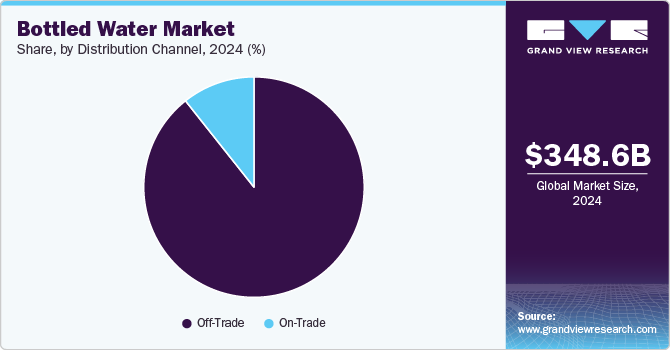
Sales of bottled water through on-trade channels are expected to grow with a CAGR of 6.8% from 2025 to 2030. Due to increasing health consciousness among consumers, a growing preference for convenient and portable hydration options, and the rising trend of premium bottled water offerings in restaurants and cafes. Additionally, the expansion of food service establishments and the integration of bottled water into dining experiences are further propelling this growth. As consumers seek healthier beverasge alternatives, the demand for bottled water in on-trade settings continues to rise. For instance, in July 2024, Chipotle introduced a new lineup of ready-to-drink beverages available at all its U.S. restaurants. This includes Open Water, which is canned water in aluminum bottles.
Regional Insights
North America bottled water market is expected to grow at a CAGR of 5.8% from 2025 to 2030. Factors such as lifestyle trends towards hydration and wellness, coupled with the wide availability and variety of bottled water products, play significant roles in driving consumption in the region. Additionally, the emphasis on portable and clean drinking water options for on-the-go consumers has bolstered the market's growth. To meet the growing customer demand for bottled water, several businesses have increased their investments in the bottled water processing market while also improving product quality and distribution channels. These advancements in processing technologies ensure higher purity, better taste, and compliance with health and safety standards, further driving the market's expansion. In April 2023, Premium Waters, Inc., a Minneapolis-based bottled water producer, announced a new bottling plant in Seguin City, Texas. Proposed at an investment of USD 80 million, the facility will span 27 acres, and the operations are expected to begin in 2024.
U.S. Bottled Water Market Trends
The bottled water market in U.S. is expected to grow at a CAGR of 5.7% from 2025 to 2030. This can be attributed to increasing health consciousness among consumers, shifting preferences from sugary drinks to healthier hydration options, and concerns over the safety and taste of municipal water supplies. In the U.S. premium bottled water, marketing efforts highlighting quality and the perceived convenience and purity of bottled water are also key factors fueling the market's expansion.
Europe Bottled Water Market Trends
The bottled water market in Europe is expected to grow at a CAGR of 5.7% from 2022 to 2030. The tourism industry in Europe significantly contributes to the demand for bottled water as tourists often rely on bottled water due to unfamiliarity with local tap water quality. Prominent European bottled water brands such as Evian (France), Perrier (France), San Pellegrino (Italy), and Vittel (France) are popular among both locals and visitors, renowned for their premium quality and mineral-rich content. These brands cater to the growing demand for natural and premium hydration, especially in tourism-heavy regions like France, Italy, and Spain, where bottled water is often preferred during travel and dining experiences. In February 2024, the Haus Cramer Group, a well-known German brewery recognized for its Warsteiner brand, broadened its product range by entering the bottled water market with the introduction of its new mineral water brand, El Puro. This strategic initiative reflects the company’s aim to capitalize on a burgeoning segment within the gastronomy sector, which increasingly highlights the significance of premium beverages, including water.
Asia Pacific Bottled Water Market Trends
Asia Pacific bottled water market accounted for a revenue share of 45.6% in 2024. This can be largely attributed to its vast population base, increasing urbanization, and growing middle class with disposable income to spend on convenient and safe drinking water options. The region experiences varied water quality concerns and infrastructural challenges, leading to a high demand for bottled water as a reliable source of hydration. In October 2023, Clear Premium Water launched its new natural mineral water brand, NUbyClear (NU), in the Indian market. This product line is distinguished by its sourcing from the pristine Himalayas, aiming to deliver the essence of these mountains directly to consumers. The launch reflects a strategic response to evolving consumer preferences in the post-COVID era, where there is a growing inclination towards healthier lifestyle choices.
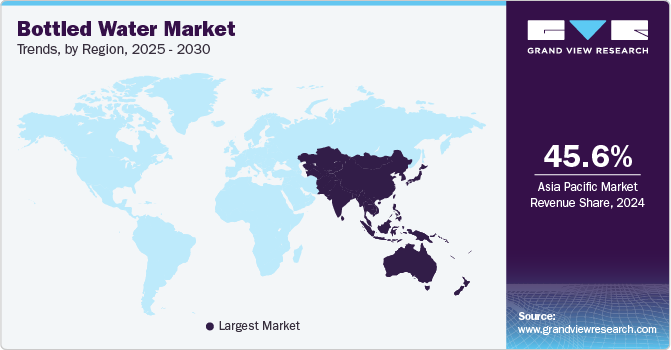
The Asia Pacific premium bottled water market outlook is promising, with rising consumer awareness of health and wellness, along with a preference for high-quality, premium hydration solutions. Countries like China and Japan are significant contributors to this market due to their large urban populations and expanding focus on premium lifestyle products. In India, the bottled water market outlook is robust, driven by rapid urbanization, an expanding middle class, and increasing concerns over water contamination. The India premium bottled water market outlook is also gaining momentum, fueled by rising health consciousness and a growing preference for luxury and wellness products.
Key Bottled Water Company Insights
The global bottled water market is dominated by several key players, each offering a diverse range of brands catering to different consumer preferences. Nestlé Waters, a major player in the industry, owns globally recognized brands such as Perrier, a naturally carbonated mineral water sourced from France, and San Pellegrino, an Italian sparkling water known for its fine bubbles and premium positioning. Additionally, Nestlé Pure Life serves as a widely available purified water brand, catering to mass-market consumers.
Another significant player, The Coca-Cola Company, has established a strong presence with brands like Dasani, a purified water brand with added minerals for taste, and Smartwater, a vapor-distilled water enhanced with electrolytes, positioned as a premium hydration choice. Similarly, PepsiCo competes with Aquafina, a widely distributed purified water brand, and LIFEWTR, which targets health-conscious consumers with added electrolytes and stylish packaging.
Key Bottled Water Companies:
The following are the leading companies in the bottled water market. These companies collectively hold the largest market share and dictate industry trends.
- Perrier (Nestlé)
- Aquafina (PepsiCo)
- Dasani (The Coca-Cola Company)
- Evian (DANONE)
- Poland Spring (Primo Water Corporation)
- Fiji Water (FIJI Water Company LLC)
- Gerolsteiner (Gerolsteiner Brunnen GmbH & Co. KG)
- Nongfu Spring (Nongfu Spring Co., Ltd.)
- National Beverage Corp
- Voss (Voss of Norway ASA)
- Himalayan Natural Mineral Water (Tata Consumer Products Limited)
- Bisleri (Bisleri International Pvt. Ltd.)
- Niagara (Niagara Bottling, LLC)
- Essentia Water (Essentia Water, LLC)
- Ethos Water (Starbucks Corporation)
- Penta Ultra-Purified Water (United Beverage, Inc.)
- Just Water (Just Goods, Inc.)
- Acqua Panna (Sanpellegrino S.p.A., a subsidiary of Nestlé)
- Hildon Natural Mineral Water (Hildon Ltd.)
- Crystal Geyser (CG Roxane LLC)
- Wahaha (Hangzhou Wahaha Group Co., Ltd.)
- Master Kong (Tingyi (Cayman Islands) Holding Corp)
Recent Developments
-
In September 2024, Waterloo Sparkling Water launched a new Pomegranate Açaí flavor and brought back their seasonal Spiced Apple flavor. Both beverages are calorie-free, sugar-free, and made with non-GMO natural flavors.
-
In August 2024, Flow Beverage Corp. announced the launch of Flow Sparkling Mineral Spring Water. The product comes in 300ml aluminum bottles made with 70% recycled material, offering four varieties: OG, Blackberry + Hibiscus, Lemon + Ginger, and Cucumber + Mint. The zero-calorie, sugar-free beverages feature sustainable packaging that uses 30% less aluminum than competitors and requires 60% less energy to produce.
-
In July 2024, Source, a company based in Scottsdale, Arizona, unveiled a groundbreaking method to tackle the water crisis by generating canned water using air and sunlight. This initiative is part of the increasing trend towards sustainable technologies that aim to resolve environmental challenges while ensuring access to vital resources. The product will be branded as Sky Wtr and is designed to offer an off-grid solution for producing drinking water. Source intends to launch this water for public sale across the U.S. in major retail outlets around August or September 2024. The canned drinking water will be packaged in recyclable aluminum cans and bottles.
-
In February 2024, Gatorade announced the launch of its first unflavored water product, Gatorade Water in the U.S., marking a significant expansion into the bottled water category. This move is part of Gatorade’s strategy to diversify its offerings beyond traditional sports drinks and tap into the growing market for functional beverages. Gatorade Water is available nationwide across various retail platforms as well as on Amazon, and Gatorade.com.
Bottled Water Market Report Scope
Report Attribute
Details
Market size value in 2025
USD 372.70 billion
Revenue forecast in 2030
USD 509.18 billion
Growth rate
CAGR of 6.4% from 2025 to 2030
Historical data
2018 - 2024
Forecast period
2025 - 2030
Quantitative units
Revenue in USD million/billion, and CAGR from 2025 to 2030
Report coverage
Revenue forecast, company ranking, competitive landscape, growth factors, and trends
Segments covered
Product, distribution channel, packaging size, price range, region
Regional scope
North America; Europe; Asia Pacific; Latin America; Middle East & Africa
Country scope
U.S.; Canada; Mexico; Germany; U.K.; France; Italy; Spain; Switzerland; Netherlands; Belgium; Sweden; Austria; China; Japan; India; Australia & New Zealand; South Korea; Thailand; Indonesia; Malaysia; Vietnam; Singapore Brazil; Argentina; South Africa; UAE
Key companies profiled
Nestlé; PepsiCo; The Coca-Cola Company; DANONE; Primo Water Corporation; FIJI Water Company LLC; Gerolsteiner Brunnen GmbH & Co. KG; VOSS WATER; Nongfu Spring; National Beverage Corp.; Keurig Dr Pepper Inc.
Customization scope
Free report customization (equivalent up to 8 analysts working days) with purchase. Addition or alteration to country, regional & segment scope.
Pricing and purchase options
Avail customized purchase options to meet your exact research needs. Explore purchase options
Global Bottled Water Market Report Segmentation
This report forecasts revenue growth at the global, regional, and country levels and provides an analysis of the latest industry trends and opportunities in each of the sub-segments from 2018 to 2030. For this study, Grand View Research has segments the global bottled water market report based on product, distribution channel, packaging, packaging size, price range, and region.
-
Product Outlook (Revenue, USD Million, 2018 - 2030)
-
Spring Water
-
Flavored
-
Unflavored
-
-
Sparkling Water
-
Flavored
-
Unflavored
-
-
Functional Water
-
-
Distribution Channel Outlook (Revenue, USD Million, 2018 - 2030)
-
On-trade
-
Restaurants
-
Cafes
-
Others
-
-
Off-trade
-
Supermarkets & Hypermarkets
-
Convenience Stores
-
Grocery Stores
-
Others
-
-
-
Packaging Outlook (Revenue, USD Million, 2018 - 2030)
-
PET
-
Cans
-
Others
-
-
Packaging Size Outlook (Revenue, USD Million, 2018 - 2030)
-
Small (0.5 to 1 Liters)
-
Medium (1.1 to 5 Liters)
-
Bulk (More than 5 Liters)
-
-
Price Range Outlook (Revenue, USD Million, 2018 - 2030)
-
Mass
-
Premium
-
-
Regional Outlook (Revenue, USD Million, 2018 - 2030)
-
North America
-
U.S.
-
Canada
-
Mexico
-
-
Europe
-
Germany
-
UK
-
France
-
Italy
-
Spain
-
Switzerland
-
Netherlands
-
Belgium
-
Sweden
-
Austria
-
-
Asia Pacific
-
China
-
Japan
-
India
-
Australia & New Zealand
-
South Korea
-
Thailand
-
Indonesia
-
Malaysia
-
Vietnam
-
Singapore
-
-
Latin America
-
Brazil
-
Argentina
-
-
Middle East & Africa
-
South Africa
-
UAE
-
-
Frequently Asked Questions About This Report
b. The global bottled water market size was estimated at USD 348.64 billion in 2024 and is expected to reach USD 372.70 billion in 2025.
b. The global bottled water market is expected to grow at a compounded growth rate of 6.4% from 2025 to 2030 to reach USD 509.18 billion by 2030.
b. Sparkling bottled water is expected to growth with a CAGR of 7.9% from 2025 to 2030. The broad range of flavors and customization options in sparkling water has made it more appealing to consumers who enjoy variety in their beverages, contributing to its growing popularity..
b. Some key players operating in the bottled water market include Nestlé; PepsiCo; The Coca-Cola Company; DANONE; Primo Water Corporation; FIJI Water Company LLC; Gerolsteiner Brunnen GmbH & Co. KG; VOSS WATER; Nongfu Spring; National Beverage Corp.; Keurig Dr Pepper Inc.
b. Key factors that are driving the market growth include, increasing concerns regarding various health problems such as gastrointestinal diseases caused by the consumption of contaminated water is leading to increased demand for clean and hygienic packaged options.
Share this report with your colleague or friend.
Need a Tailored Report?
Customize this report to your needs — add regions, segments, or data points, with 20% free customization.

ISO 9001:2015 & 27001:2022 Certified
We are GDPR and CCPA compliant! Your transaction & personal information is safe and secure. For more details, please read our privacy policy.
Trusted market insights - try a free sample
See how our reports are structured and why industry leaders rely on Grand View Research. Get a free sample or ask us to tailor this report to your needs.










